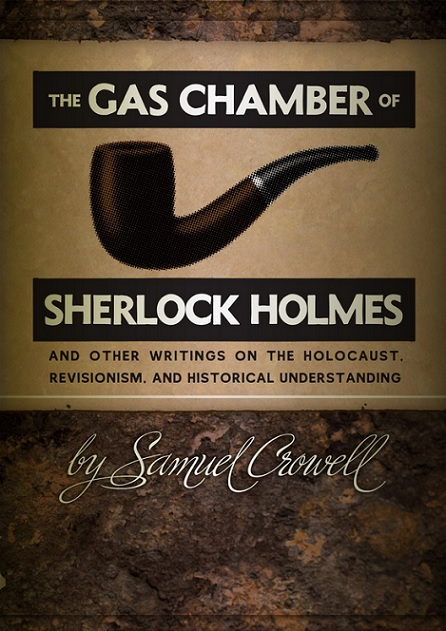
In short, it will be possible to see that the generation of a delusion of mass gas extermination did not require a conspiracy or a hoax, nor much conscious effort at all, but only a social and cultural climate that would facilitate such claims, at a time of war, hatred, and social anomie. We will see that such claims, reinforced here and there by a little helpful fraud, but above all by a simple willingness to believe the worst about one's enemies, would allow dark rumors to be stated as fact and become themselves part of that social and cultural landscape of which we are only half-consciously aware.
Samuel Crowell - The Gas Chamber of Sherlock Holmes
An Attempt at a Literary Analysis of the Holocaust Gassing Claim
Among scholars and the general public, the prevailing consensus holds that millions of European Jews were sent to death in gas chambers as part of an official Nazi policy of mass extermination during the Second World War. So entrenched is this consensus that throughout the Western world those who publicly question its accuracy are now routinely subject to censorship, academic censure, and even criminal prosecution. In contemporary society, no other species of dissident scholarship is met with comparably illiberal reaction.
In an intellectual atmosphere thus poisoned by acrimony and haunted by the specter of persecution, The Gas Chamber of Sherlock Holmes stands as a calm, deftly reasoned, and highly original affirmation of intellectual freedom. Drawing on extensive empirical and documentary evidence as well as methods of cultural criticism conventionally eschewed by field historians, Samuel Crowell argues that the "canonical&" Holocaust gassing claim can be traced to a fateful crisis of modernism -- a crisis revealed in popular texts and long-forgotten cultural ephemera. Spanning from the earliest broadcast rumors to the extermination narrative that was sealed at Nuremberg, Crowell s probing analysis permits us to consider how a grim narrative emerged and evolved in the cyclonic momentum of an era marked by social upheaval, total war, and unprecedented technological change.
Reading Samuel Crowell's The Gas Chamber of Sherlock Holmes is a little like stumbling across a rational mind in an insane asylum years after being taken hostage by the inmates. Following prolonged immersion in clashing dogmas, the dispassionate use of evidence and logic to arrive at a sensible conclusion comes as a jolting but thoroughly pleasant surprise. And Crowell's modesty in stating that conclusion tentatively, knowing that genuinely rational inquiry will and should be superseded by later efforts, is an equally refreshing departure from polemical norms.
Drawing on establishment and revisionist authors, along with a careful scrutiny of German source documents, Crowell deftly evaluates contending claims arguing that Nazi "gas chambers" were (1) weapons of extermination (2) disinfection chambers (3) bomb shelters designed to protect against aerial gas attacks. Aligning eyewitness testimony with the material and documentary record, he sketches out the basis for a rational opinion, putting readers in a position to make their own judgments, without first requiring that they join in partisan warfare. Thanks to this effort we no longer need choose between delusional orthodoxy and strident dissidence, but can simply weigh evidence. This should come as a relief to everyone, while hopefully expanding the number of readers who can move beyond ritual denunciation and actually take the gas chamber debate seriously.
Crowell's work contains not a trace of anti-Semitism. He makes no attempt to whitewash Nazi racial policy, which he characterizes as a "shameful and disgraceful chapter in Germany history," even if "we assumed revisionist theses to their maximum extent." The important consideration, he notes, is that "we would still be dealing with about a million dead European Jews, who died as a direct result of Nazi persecution, plunder, forced labor, deportation, and yes, mass killing." As for his personal beliefs, he says, "they remain what they have been for thirty years or more," that "there certainly was a Holocaust in the sense that Nazi Germany persecuted and massacred many Jews," with the likelihood "that this massacre ran into the millions." Philosemitic crusaders, please take note.
A self-declared "moderate revisionist" who clearly values the standards of rational investigation, Crowell avoids exaggeration, misrepresentation, and self-righteousness. He shows no reluctance to admit when a conclusion is debatable or when the evidence is open to varying interpretations; and he is able to perceive shortcomings in the views and tactics of those who share a revisionist stance - and even some merit in those who do not. This adds credibility to his analysis, and marks him as a rare breed of intellectual who actually does what he is supposed to do: face up to facts and plausibly explain them. It is truly sad that on such an important topic his open-mindedness is all but unique. - Michael K. Smith, author of The Madness of King George
About the Author :
Samuel Crowell is the pseudonym of a self-described "moderate revisionist" who has written extensively on the Holocaust controversy and other subjects. He is a graduate of the University of California (Berkeley), where he studied philosophy, foreign languages, and modern European history. Mr. Crowell continued his studies in history at Columbia University, and taught on the college level for six years.

See also :
Rudolf Germar
Carlo Mattogno
Jürgen Graf
James Bacque
Richard Verrall
Alfred-Maurice de Zayas
Carlos Whitlock Porter
Udo Walendy
Siegfried Ellwanger Castan
For more



